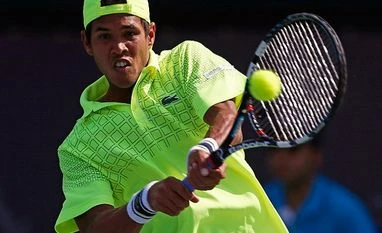As the clock turned to a new year, so did it on the career of one of India’s finest men’s singles tennis players of the last decade. While scouring Twitter accounts late on the night of December 31, among other messages came this from the official account of Somdev Devvarman: “Starting 2017 on a new note, retiring from pro tennis. Thanks to everyone for the love and support over the years.”
Devvarman, 31, last played in the qualifying round of the BNP Paribas Open in March 2016; he was placed 911 in the latest ATP rankings. Injuries took a toll on his career, but even then, the announcement is surprising, mainly on account of his relatively young age in comparison to other Indian tennis players.
Leander Paes (43), Mahesh Bhupathi (42) and for that matter 36-year-old Rohan Bopanna, all of whom played in 2016, are examples of age being just a number. An important point, though, is they are primarily doubles players. Enrico Piperno, former Indian player who later coached India’s Davis Cup and Federation Cup teams, says, “Everybody can raise doubts about why Somdev retired at 31 when the likes of Paes, Bhupathi and Bopanna have played for so long. People fail to see the distinction between singles and doubles tennis. There are, of course, exceptions like Roger Federer, but most singles players are now retiring in their early 30s.”
Devvarman pointed to dipping motivation as the cause of his retirement. “Playing for me was always super fun and passion, that was dying or slowing down,” Devvarman told reporters at the sidelines of the Chennai Open. “I wanted to be in the top 100, but started reaching a point through injuries where I felt it would be tough to return to the top 100.”
The year 2010 was arguably Devvarman’s finest moment as he won the gold medal in men’s singles at the Delhi Commonwealth Games and a month later, at the Guangzhou Asian Games. By adding the gold medal in the men’s doubles events at the latter meet, it became literally a “golden double”. A year later, he reached a career-high of 62 in men’s singles.
For all of India’s success in doubles tennis, globally singles remains the bigger draw — it is here that Devvarman’s inability to go deep in major tournaments as well as beating the top players will be held against him. The furthest he ever progressed at a Grand Slam was the second round, on a total of five occasions, including his main draw debut, the 2009 US Open. His best chance to go deep in a slam was the 2013 Australian Open, when he led 24th seeded Jerzy Janowicz by two sets to love, but went on to lose the match.
In six career meetings with Federer, Rafael Nadal, Andy Murray and Novak Djokovic, he has failed to beat any of them, let alone take a set. By sheer value his two biggest victories would be beating Marin Cilic, the current world number 6 and 2014 US Open champion, at the 2009 Washington Classic, when the latter was ranked 15th in the world. The other would be beating Juan Martin Del Potro, the 2009 US Open champion and then world number 5, in the 2014 Dubai Tennis Championships. It might be added that the victory was achieved when Del Potro pulled out after losing the first set.
According to Piperno, it would be unfair to call Devvarman’s career a disappointment. “I would call him an overachiever. His career panned out better than I expected it to. He didn’t have too many weapons in his game and lacked the tools to ever become a top 50 player, let alone reach the world’s top 20,” says Piperno. “That he reached a career-high ranking of 62 does credit to him, because most of us never believed he could crack the world’s top 100.”
Devvarman’s game mostly relied on playing from the baseline and court speed, and that might have played some part in the spate of injuries that piled up over his career. Though there is no comparison between the two in terms of performance, Piperno takes the example of Nadal, who is 30, to exemplify why overtly physical players can have a shorter shelf life than others.
Devvarman made the most of his limited gifts through sheer hard work and determination. In his retirement, India has lost arguably one of its last great singles players. With talk of him looking to get into coaching, let’s hope he can give something back to the game.
Unlock 30+ premium stories daily hand-picked by our editors, across devices on browser and app.
Pick your 5 favourite companies, get a daily email with all news updates on them.
Full access to our intuitive epaper - clip, save, share articles from any device; newspaper archives from 2006.
Preferential invites to Business Standard events.
Curated newsletters on markets, personal finance, policy & politics, start-ups, technology, and more.
)